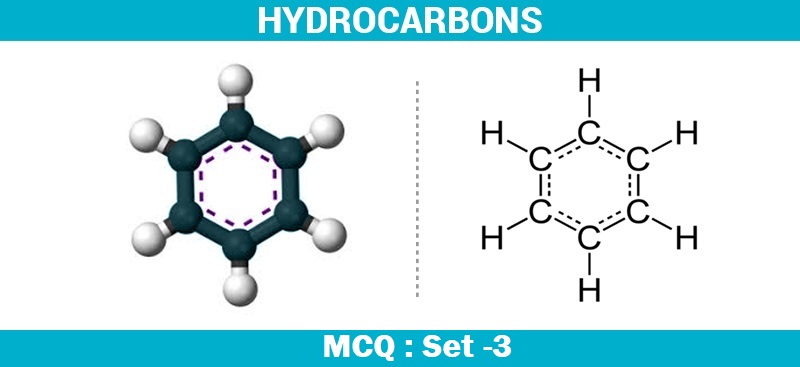CBSE Class 11 Chemistry Chapter 13 Hydrocarbons Multiple Choice Questions with Answers. MCQ Questions Class 11 Chemistry Hydrocarbons with Answers was Prepared Based on Latest Exam Pattern. Students can solve NCERT Class 11 Chemistry Hydrocarbons MCQs with Answers to know their preparation level.
Students who are searching for NCERT MCQ Questions for Class 11 Chemistry Hydrocarbons with Answers are compiled here to get good practice on all fundamentals. Know your preparation level on MCQ Questions for Class 11 Chemistry with Answers. You can also verify your answers from our provided MCQ Class 11 Chemistry Hydrocarbons with Answers. So, ace up your preparation with MCQ of Chapter 13 Chemistry Objective Questions.
MCQ Questions Class 11 Chemistry Hydrocarbons with Answers - Set - 3
Question 1:
Question. A compound is treated with NaNH2 to give sodium salt. Identify the compound.
(a) C2H2
(b) C6H6
(c) C2H6
(d) C2H4
Correct Answer – (A)
Question 2 :
Question. Which of the following reagents will be able to distinguish between 1-butyne and 2-butyne?
(a) NaNH2
(b) HCl
(c) O2
(d) Br2
Correct Answer – (A)
Question 3 :
Question. Which of the following has zero dipole moment?
(a) 1-Butene
(b) 2-Methyl-1-propene
(c) cis-2-Butene
(d) trans-2-Butene
Correct Answer – (D)
Question 4 :
Question. The pair of electrons in the given carbanion,CH3C C –, is present in which of the followingorbitals?
(a) sp2
(b) sp
(c) 2p
(d) sp3
Correct Answer – (B)
Question 5 :
Question. The restricted rotation about carbon carbon double bond in 2-butene is due to
(a) overlap of one s and sp2-hybridized orbitals
(b) overlap of two sp2-hybridized orbitals
(c) overlap of one p and one sp2-hybridized orbitals
(d) sideways overlap of two p-orbitals.
Correct Answer – (D)
MCQ Questions Class 11 Chemistry Hydrocarbons with Answers
Question 6 :
Question. The cylindrical shape of an alkyne is due to
(a) two sigma C – C and one p C – C bonds
(b) one sigma C – C and two p C – C bonds
(c) three sigma C – C bonds
(d) three p C – C bonds.
Correct Answer – (B)
Question 7 :
Question. One of the following which does not observe the anti-Markownikoff’s addition of HBr, is
(a) pent-2-ene
(b) propene
(c) but-2-ene
(d) but-1-ene.
Correct Answer – (C)
Question 8 :
Question. Which of the following organic compounds hassame hybridization as its combustion product (CO2)?
(a) Ethane
(b) Ethyne
(c) Ethene
(d) Ethanol
Correct Answer – (B)
Question 9 :
Question. Which one of the following can exhibit cis-trans isomerism?
(a) CH3 – CHCl – COOH
(b) H – C≡ C – Cl
(c) ClCH =CHCl
(d) ClCH2 – CH2Cl
Correct Answer – (C)
Question 10 :
Question. Reduction of 2-butyne with sodium in liquidammonia gives predominantly
(a) cis-2-butene
(b) no reaction
(c) trans-2-butene
(d) n-butane.
Correct Answer – (C)
- NCERT Solutions Class 11 Chemistry Chapter 1 : Some Basic Concepts of Chemistry
- NCERT Solutions Class 11 Chemistry Chapter 2 : Structure Of The Atom
- NCERT Solutions Class 11 Chemistry Chapter 3 : Classification of Elements and Periodicity in Properties
- NCERT Solutions Class 11 Chemistry Chapter 4 : Chemical Bonding and Molecular Structure
- NCERT Solutions Class 11 Chemistry Chapter 5 : States of Matter
- NCERT Solutions Class 11 Chemistry Chapter 6 : Thermodynamics
- NCERT Solutions Class 11 Chemistry Chapter 7 : Equilibrium
- NCERT Solutions Class 11 Chemistry Chapter 8 : Redox Reactions
- NCERT Solutions Class 11 Chemistry Chapter 9 : Hydrogen
- NCERT Solutions Class 11 Chemistry Chapter 10 : The s-Block Elements
- NCERT Solutions Class 11 Chemistry Chapter 11 : The p-Block Elements
- NCERT Solutions Class 11 Chemistry Chapter 12 : Organic Chemistry: Some Basic Principles and Techniques
- NCERT Solutions Class 11 Chemistry Chapter 13 : Hydrocarbons
- NCERT Solutions Class 11 Chemistry Chapter 14 : Environmental Chemistry



